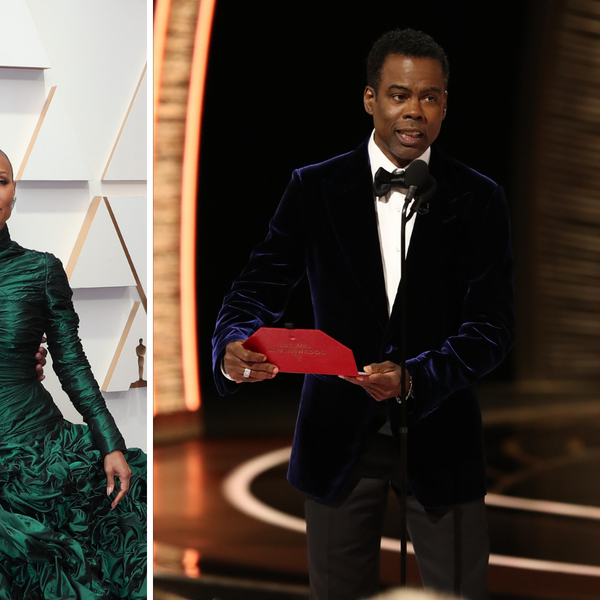
By now you’ve heard about Will Smith slapping Chris Rock at the Oscars after Rock told a bad joke related to Jada Pinkett Smith’s alopecia.
I’m less interested in talking about The Slap™ however and more interested in talking about something that happened mere moments later. A photo captured Will Smith being spoken to by Denzel Washington and Tyler Perry a few feet away from the Oscars stage during the first commercial break that came after the altercation.
There’s not much known to the public about what was said during the conversation aside from what Smith said during this acceptance speech when told the audience that Washington said “At your highest moment, be careful. That’s when the devil comes for you.” Reportedly Washington also went to comfort Pinkett Smith after speaking with Smith.
READ MORE: THE 94TH OSCARS BLACK HISTORY MOMENTS WE SHOULDN'T FORGET
It's a moment that’s gotten lost in all the chaos of the discourse that’s been generated after the events that unfolded. A moment of tenderness and love that resembles so much of what’s missing from the current conversation around Smith’s actions.
Regardless of how you feel about Smith’s action – disappointed, elated, angry, bemused – I’ve been frustrated about certain reactions that have fixated on wanting the actor to receive carceral punishment. Many people both in and outside the legal system view hitting someone without physical provocation to be illegal, punishable by imprisonment or at least some form of state sanctioned penalty such as probation or community service. But the calls to incarcerate Smith seem to ignore the fact that Rock has reportedly already declined to press charges against Smith, thus begging the question: who is it that we are protecting by insisting on carceral solutions if the person harmed here is not interested in pursuing any legal recourse?
The supposed violence people seem to be reacting to is not even the violence that allows for Rock to make a joke minimizing Jada’s health and using it as comedic fodder for a (mostly) white audience. The harm they’re reacting to has even less to do with Smith’s hand swiftly connecting to Rock’s face. It’s about forcing people to contend with impolite emotions and reactions in public. It’s the violence of violating the rule of civility in the face of oppression that white institutions such as the Oscars cloak themselves in. It’s evident by how many people have suggested that Smith should’ve just confronted Rock behind the scenes instead of on stage for all to see. Or how people who claim “violence is never the answer” can so easily suggest an inherently violent place like prison as a solution for every single problem that arises in our society. “Prisons do not disappear social problems, they disappear human beings,” as Angela Davis wrote.
If a Black man who has had a professional and personal reputation of being one of the nicest men in Hollywood for over the course of his three-decade career can immediately be villainized, I shudder at the thought of the way people are treating the Black boys and Black men in their everyday lives with considerably less social and monetary capital. Even the way white people continue to reconfigure Rock as a white person (“what if he were Betty White?!” What if he were Bob Saget?!”) in their supposed defense of Rock shows the limits of their concern and that they can’t even summon sympathy for the Black man that they’re claiming was harmed without casting themselves as the victims.
People struggle to imagine what accountability looks like without prisons but we must. Accountability in this situation could look like Smith, Pinkett-Smith, and Rock coming together to have a private conversation about what transpired and then bringing it to a public platform like Pinkett-Smith’s talk show Red Table Talk to have a discussion about alopecia, as well as ableism and misogynoir in comedy. And sometimes accountability looks like being pulled to the side by an elder like Washington that will gently but firmly correct you. Accountability is an act of love and community. And Sunday night showed us a brief glimpse of what that looks like.
Eva Marcille On Starring In 'Jason’s Lyric Live' & Being An Audacious Black Woman
Eva Marcille has taken her talents to the stage. The model-turned-actress is starring in her first play, Jason’s Lyric Live alongside Allen Payne, K. Michelle, Treach, and others.
The play, produced by Je’Caryous Johnson, is an adaptation of the film, which starred Allen Payne as Jason and Jada Pinkett Smith as Lyric. Allen reprised his role as Jason for the play and Eva plays Lyric.
While speaking to xoNecole, Eva shares that she’s a lot like the beloved 1994 character in many ways. “Lyric is so me. She's the odd flower. A flower nonetheless, but definitely not a peony,” she tells us.
“She's not the average flower you see presented, and so she reminds me of myself. I'm a sunflower, beautiful, but different. And what I loved about her character then, and even more so now, is that she was very sure of herself.
"Sure of what she wanted in life and okay to sacrifice her moments right now, to get what she knew she deserved later. And that is me. I'm not an instant gratification kind of a person. I am a long game. I'm not a sprinter, I'm a marathon.
America first fell in love with Eva when she graced our screens on cycle 3 of America’s Next Top Model in 2004, which she emerged as the winner. Since then, she's ventured into different avenues, from acting on various TV series like House of Payne to starring on Real Housewives of Atlanta.

Je-Caryous Johnson Entertainment
Eva praises her castmates and the play’s producer, Je’Caryous for her positive experience. “You know what? Je’Caryous fuels my audacity car daily, ‘cause I consider myself an extremely audacious woman, and I believe in what I know, even if no one else knows it, because God gave it to me. So I know what I know. That is who Je’Caryous is.”
But the mom of three isn’t the only one in the family who enjoys acting. Eva reveals her daughter Marley has also caught the acting bug.
“It is the most adorable thing you can ever see. She’s got a part in her school play. She's in her chorus, and she loves it,” she says. “I don't know if she loves it, because it's like, mommy does it, so maybe I should do it, but there is something about her.”
Overall, Eva hopes that her contribution to the role and the play as a whole serves as motivation for others to reach for the stars.
“I want them to walk out with hope. I want them to re-vision their dreams. Whatever they were. Whatever they are. To re-see them and then have that thing inside of them say, ‘You know what? I'm going to do that. Whatever dream you put on the back burner, go pick it up.
"Whatever dream you've accomplished, make a new dream, but continue to reach for the stars. Continue to reach for what is beyond what people say we can do, especially as [a] Black collective but especially as Black women. When it comes to us and who we are and what we accept and what we're worth, it's not about having seen it before. It's about knowing that I deserve it.”
This interview has been edited for length and clarity.
Let’s make things inbox official! Sign up for the xoNecole newsletter for love, wellness, career, and exclusive content delivered straight to your inbox.
Feature image by Leon Bennett/WireImage
This Moisturizer Comes With A Built-In Sculpting Tool—And It Lowkey Changed My Skincare Routine
Gua sha, essence, serums, moisturizer, and SPF are a few of the many steps incorporated in an everyday skincare routine. However, it’s easy to skip a step or two to save time.
And in my case, I’ve wondered how crucial it would be if I slack on an essence or gua sha routine, so my routine doesn’t feel as extensive. With skincare routines getting longer, I always appreciate a two-in-one product.
Now and then, the beauty industry releases a two-in-one product that makes life worth living again. One of those brands is REFY.
The Hype Behind REFY's Face Sculpt Moisturizer With Built-In Roller
The company shook the industry when it first released its REFY Glow and Sculpt Face Serum Primer With Niacinamide. Now they’ve come out with a moisturizer version of the product. The Face Sculpt by REFY is the world's first moisturizer with a sculpting piece attached.
The product aims to lift the skin while hydrating it at the same time. This is music to my ears, since it’s one less step I have to take separately and still get my facelift.

Face Sculpt by REFY is the "world's first facial sculpting moisturizer that instantly lifts, defines and hydrates."
REFY
Key Ingredients in REFY's Sculpting Moisturizer: What Your Skin Will Love
Before I try any product, I always look at the ingredients. It’s important to know what's going on with your skin. Doing this extra step can help you learn the benefits or risks you’re up against. I love that this moisturizer is filled with glycerin and provitamin B5.
Glycerin is incredible for deeply hydrating the skin, which is essential since I have dry skin. Provitamin B5 is an ingredient I rarely see in most skincare products. It’s excellent for calming the skin and reducing redness. This can come in handy on mornings when your skin is puffy and needs to calm down.
How To Use REFY’s Face Sculpt Moisturizer for Best Results
When applying the product, I learned that patience is key. Rolling the moisturizer into your skin won’t melt in as quickly as using your hands. I found this beneficial since it meant the moisturizer was slowly working its way into my pores, instead of forcing it in. I worked the “roller” in upward motions to ensure I got the face lift effect I sought.
Although the facelift didn’t come instantly, I knew it would come in time if I were consistent enough—four weeks to be exact.

REFY
Four-Week Facelift or Nah? My First Impressions
The website shows various final results after using the moisturizer for four weeks. Several women are posing with pride, showing off their final results. There was a slight difference in lifting for each face. In addition, their smile wrinkles have subsided.
I look forward to these results as I continue to use this product consistently. I encourage everyone to check out the results on their website, as they're worth looking into before you start.
After using this product immediately, I noticed a noticeable difference in hydration. The moisturizer created a luminous effect on my skin that I deeply appreciated. I also loved how much it helped with lymphatic drainage. Since I had to work in the moisturizer, the rolling motions helped smooth out my skin. Allowing for a depuffing effect before starting my day.
Final Thoughts: Is REFY's Face Sculpt Worth It?
I give this product a 10 out of 10. It's perfect for all skin types, but especially those looking for a subtle face lift. With patience and commitment, your skin can be perky and ready for the day!
Remember to roll day and night so your skin can stay plump.
Let’s make things inbox official! Sign up for the xoNecole newsletter for love, wellness, career, and exclusive content delivered straight to your inbox.
Featured image by insta_photos/Getty Images









